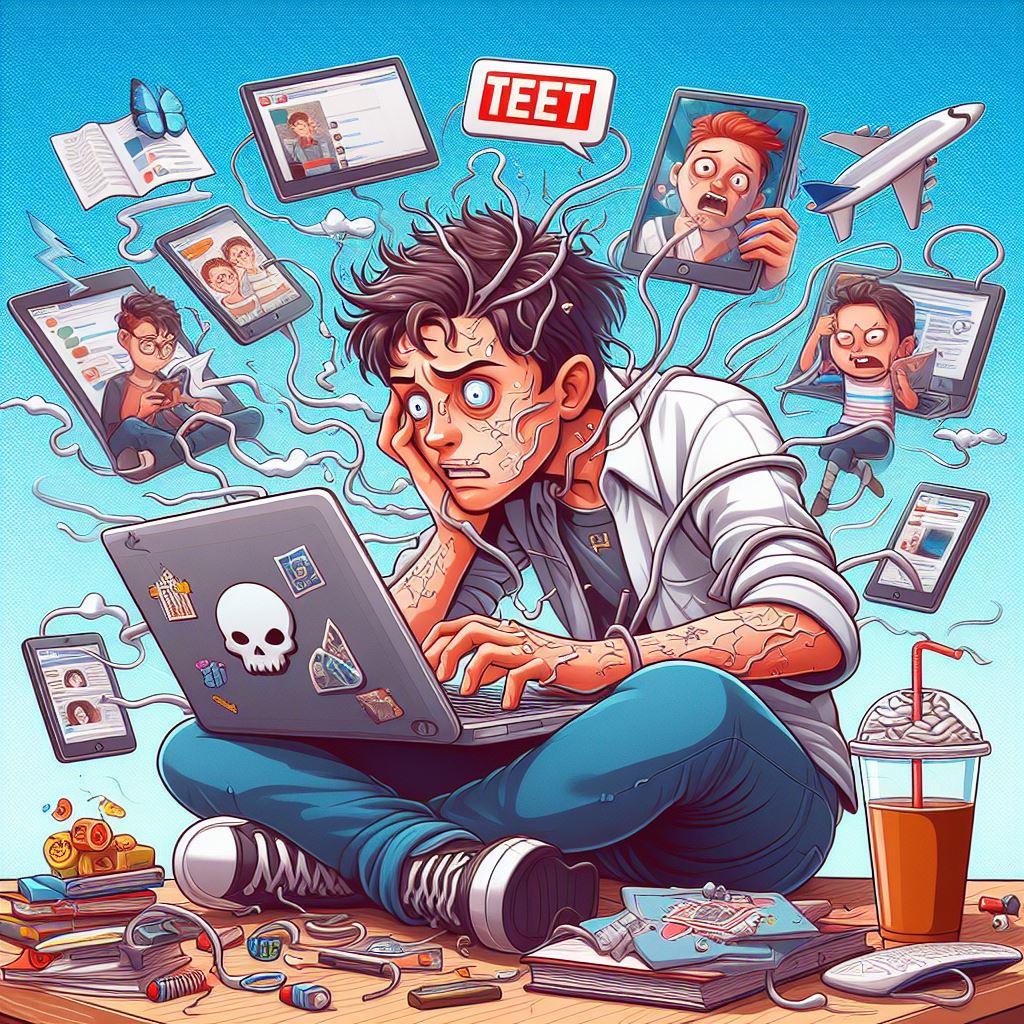Abstract: This paper explores the multifaceted impact of internet addiction on the daily life of teenagers in Pakistan. With the proliferation of digital technology, adolescents are increasingly drawn towards the virtual world, often at the expense of their physical and mental well-being. Drawing from research and case studies, this paper examines the manifestations of internet addiction, its consequences on academic performance, social relationships, and mental health, and proposes strategies for prevention and intervention. By shedding light on this pressing issue, this paper aims to foster greater awareness and facilitate informed discourse on mitigating the adverse effects of internet addiction among Pakistani youth.

- Introduction: The internet has become an integral part of modern life, revolutionizing communication, education, and entertainment. However, its excessive and unregulated use has given rise to a phenomenon known as internet addiction, particularly prevalent among teenagers. In Pakistan, where access to the internet has surged in recent years, adolescents are increasingly susceptible to the allure of cyberspace. This paper aims to delve into the impact of internet addiction on the daily lives of Pakistani teenagers, examining its implications for academic performance, social interactions, and mental health.
- Understanding Internet Addiction: Internet addiction is characterized by excessive, compulsive use of the internet, leading to negative consequences in various domains of life. It shares similarities with substance addiction, involving tolerance, withdrawal symptoms, and unsuccessful attempts to cut back on usage. Factors contributing to internet addiction include easy access to digital devices, social media, online gaming, and the need for escapism or validation. In Pakistan, where smartphones are ubiquitous and data plans are affordable, teenagers are particularly vulnerable to developing problematic internet usage patterns.
- Manifestations of Internet Addiction: Internet addiction manifests in diverse ways, ranging from excessive gaming and social media use to compulsive online shopping and pornography consumption. Pakistani teenagers often spend hours scrolling through social media feeds, playing online games, or binge-watching videos, neglecting other responsibilities and activities. This sedentary lifestyle not only impacts physical health but also disrupts sleep patterns and contributes to academic procrastination.

- Impact on Academic Performance: One of the most significant repercussions of internet addiction is its detrimental effect on academic performance. Excessive screen time reduces the time available for studying and completing assignments, leading to poor grades and academic underachievement. Moreover, the constant distractions offered by the internet hinder concentration and impair cognitive functions, making it harder for students to focus during classes or exams. Studies have shown a negative correlation between internet addiction and academic success among Pakistani teenagers, highlighting the need for intervention.
- Social Implications: Internet addiction can also compromise the quality of social interactions among teenagers. While social media platforms facilitate connectivity, they can also breed feelings of loneliness, jealousy, and inadequacy. Pakistani adolescents often compare their lives to idealized images portrayed on social media, leading to self-esteem issues and social isolation. Furthermore, excessive screen time detracts from face-to-face interactions, weakening interpersonal skills and hindering the development of meaningful relationships.
- Mental Health Consequences: The psychological toll of internet addiction cannot be overstated, with adolescents experiencing heightened levels of anxiety, depression, and stress. The constant barrage of online notifications and the pressure to maintain a curated online persona contribute to feelings of inadequacy and insecurity. Pakistani teenagers, already grappling with societal expectations and academic pressures, are particularly susceptible to the adverse mental health effects of internet addiction. Left unchecked, this can lead to a vicious cycle of escapism and withdrawal, exacerbating existing mental health conditions.
- Strategies for Prevention and Intervention: Addressing internet addiction requires a multifaceted approach involving parents, educators, policymakers, and mental health professionals. Awareness campaigns can educate teenagers and their families about the signs and consequences of excessive internet use, encouraging healthier digital habits. Schools can integrate digital literacy programs into the curriculum, teaching students how to use the internet responsibly and critically evaluate online content. Moreover, parental supervision and setting limits on screen time can help mitigate the risk of internet addiction among adolescents. For those already struggling with problematic internet use, counseling and therapy provide invaluable support, addressing underlying issues and promoting healthier coping mechanisms.

- Conclusion: Internet addiction poses a significant threat to the well-being of teenagers in Pakistan, undermining academic performance, social relationships, and mental health. Recognizing the pervasive impact of internet addiction is the first step towards mitigating its adverse effects. By fostering a culture of digital responsibility and providing support to vulnerable adolescents, we can empower Pakistani youth to navigate the online world safely and sustainably. Through concerted efforts from various stakeholders, we can strive towards a future where technology enriches rather than detracts from the daily lives of teenagers in Pakistan.



